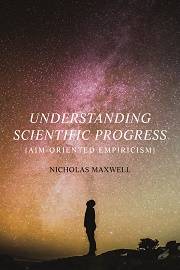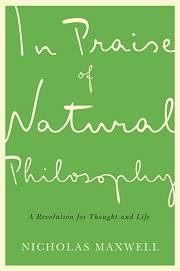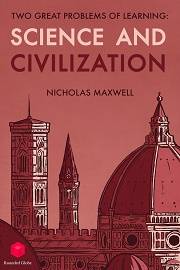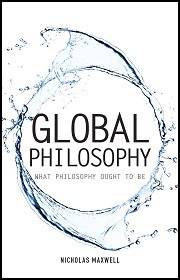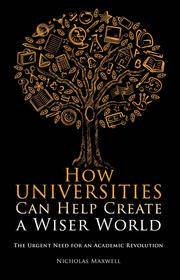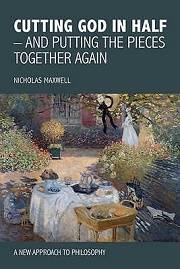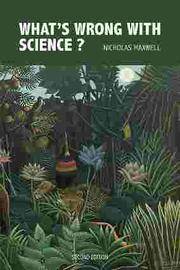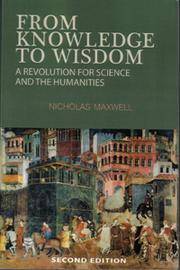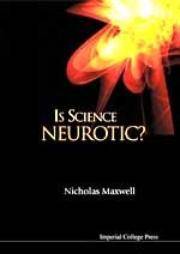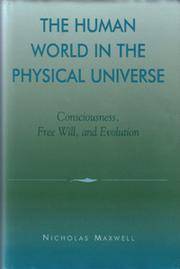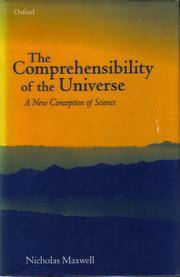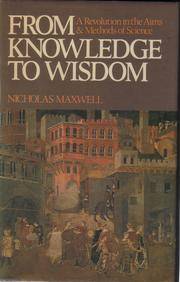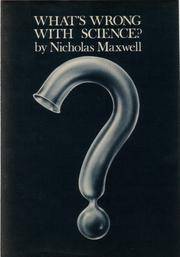Reviews of Nicholas Maxwell's Work | Reviews of From Knowledge to Wisdom | Reviews of the Comprehensibility of the Universe | Reviews of The Human World in the Physical Universe | Reviews of Is Science Neurotic? | Reviews of Science and the Pursuit of Wisdom | Review of Cutting God in Half - And Putting the Pieces Together Again | Reviews of How Universities Can Help Create a Wiser World | Reviews of Global Philosophy | Reviews of In Praise of Natural Philosophy | Reviews of Understanding Scientific Progress | Listing of Reviews of From Knowledge to Wisdom | Discussions of Aspects of Nicholas Maxwell's Work | Full Review in Nature of From Knowledge to Wisdom | Iredale's full Review of Is Science Neurotic? | Review of Global Philosophy
Excerpts from reviews of Nicholas Maxwell's work
"Maxwell's theory of aim-oriented empiricism is the outstanding work on scientific change since Lakatos, and his thesis is surely correct. Scientific growth should be rationally directed through the discussion, choice, and modification of aim-incorporating blueprints rather than left to haphazard competition among research traditions seeking empirical success alone."
"Of the theories of scientific change and rationality that I know, Maxwell's is my first choice. It is broad in scope, closely and powerfully argued, and is in keeping with the purpose of this book, which is to see science in its totality. No other theory provides, as Maxwell's does in principle, for the rational direction of the overall growth of science."
(Professor George F. Kneller, Science as a Human Endeavor, Columbia University Press, 1978, p. 84 and p. 91.)
Back to Top
Extracts from Some Reviews of From Knowledge to Wisdom: A Revolution in the Aims and Methods of Science, Basil Blackwell, Oxford, 1984, pp. viii + 299. Paperback editions, 1987 and 1988.
"Maxwell's book is a major contribution to current work on the intellectual status and social functions of science ... [It] comes as an enormous breath of fresh air, for here is a philosopher of science with enough backbone to offer root and branch criticism of scientific practices and to call for their reform."
Dr. David Collingridge, Social Studies of Science.
This book is the work on an unashamed idealist; but it is none the worse for that. The author is a philosopher of science who holds the plain man's view that philosophy should be a guide to life, not just a cure for intellectual headaches. He believes, and argues with passion and conviction, that the abysmal failure of science to free society from poverty, hunger and fear is due to a fatal flaw in the accepted aim of scientific endeavour - the acquistion and extension of knowledge ...The philosophy of wisdom commends itself, furthermore, not only to the heart but to the head: it gives science and scholarship a proper place in the human social order. . . Nicholas Maxwell has breached the conventions of philosophical writing by using, with intent, such loaded words as 'wisdom', 'suffering' and 'love'. 'That which is of value in existence, associated with human life, is inconceivably, unimaginably, richly diverse in character.' What an un-academic proposition to flow from the pen of a lecturer in the philosophy of science; but what a condemnation of the academic outlook, that this should be so. Maxwell is advocating nothing less than a revolution (based on reason, not on religious or Marxist doctrine) in our intellectual goals and methods of inquiry ... There are altogether too many symptoms of malaise in our science-based society for Nicholas Maxwell's diagnosis to be ignored."
Professor Christopher Longuet-Higgins, Nature.
"The essential idea is really so simple, so transparently right ... It is a profound book, refreshingly unpretentious, and deserves to be read, refined and implemented."
Dr. Stewart Richards, Annals of Science.
"... a strong effort is needed if one is to stand back and clearly state the objections to the whole enormous tangle of misconceptions which surround the notion of science to-day. Maxwell has made that effort in this powerful, profound and important book."
Dr. Mary Midgley, University Quarterly.
"A humanist and philosopher, Maxwell presents his ideas with eloquence and conviction. This book will appeal to persons in many different disciplines - from science to social studies."
American Library Association.
"This book is a provocative and sustained argument for a 'revolution', a call for a 'sweeping, holistic change in the overall aims and methods of institutionalized inquiry and education, from knowledge to wisdom' ... Maxwell offers solid and convincing arguments for the exciting and important thesis that rational research and debate among professionals concerning values and their realization is both possible and ought to be undertaken."
Professor Jeff Foss, Canadian Philosophical Review.
"Wisdom, as Maxwell's own experience shows, has been outlawed from the western academic and intellectual system ... In such a climate, Maxwell's effort to get a hearing on behalf of wisdom is indeed praiseworthy."
Dr. Ziauddin Sardar, Inquiry.
"Maxwell has, I believe, written a very important book which will resonate in the years to come. For those who are not inextricably and cynically locked into the power and career structure of academia with its government-industrial-military connections, this is a book to read, think about, and act on."
Dr. Brian Easlea, Journal of Applied Philosophy.
"Maxwell's argument ... is a powerful one. His critique of the underlying empiricism of the philosophy of knowledge is coherent and well argued, as is his defence of the philosophy of wisdom. Most interesting, perhaps, from a philosophical viewpoint, is his analysis of the social and human sciences and the humanities, which have always posed problems to more orthodox philosophers, wishing to reconcile them with the natural sciences. In Maxwell's schema they pose no such problems, featuring primarily ... as methodologies, aiding our pursuit of our diverse social and personal endeavours.
"This is an exciting and important work, which should be read by all students of the philosophy of science. It also provides a framework for historical analysis and should be of interest to all but the most blinkered of historians of science and philosophy."
Dr. John Hendry, British Journal for the History of Science.
"This book is written in simple straightforward language … The style is passionate, committed, serious; it communicates Maxwell's conviction that we are in deep trouble, that there is a remedy available, and that it is ingrained bad intellectual habits that prevent us from improving our lot … Maxwell is raising an important and fundamental question and things are not going so well for us that we should afford the luxury of listening only to well-tempered answers."
Professor John Kekes, Inquiry
"… a major source of priorities, funds and graduates' jobs in 'pure science' is military … this aspect of science is deemed irrelevant by the overwhelming majority of those who research, teach, sociologize, philosophise or moralize about science. What are we to make of such a phenomenon? It is in part a political situation, in its causes and effects; but it is also philosophical, and this is Nick Maxwell's point of focus. Such a gigantic co-operative endeavour of concealment, amounting to a huge deception, could be accomplished naturally by all educated, humane participants, a 'conspiracy needing no conspirators', only because their 'philosophy of knowledge' envelops them in the assurance that their directors, paymasters and employers have nothing to do with the real thing - the research. This, to me, is the heart of Maxwell's message."
Dr. Jerry Ravetz, British Journal for the Philosophy of Science
"Because Maxwell so obviously understands and loves science as practiced, say, by an Einstein, his criticisms of current science seem to arise out of a sadness at missed opportunities rather than hostility … I found Maxwell's exposition and critique of the current state of establishment science to be clear and convincing … Maxwell is right to remind us that in an age of Star Wars and impending ecological disaster, talk of the positive potential of means-oriented science can easily become an escapist fantasy."
Professor Noretta Koertge, Isis
"In this book, Nicholas Maxwell argues powerfully for an intellectual "revolution" transforming all branches of science and technology. Unlike such revolutions as those described by Thomas Kuhn, which affect knowledge about some aspect of the physical world, Maxwell's revolution involves radical changes in the aims, methods, and products of scientific inquiry, changes that will give priority to the personal and social problems that people face in their efforts to achieve what is valuable and desirable."
Professor George Kneller, Canadian Journal of Education
"[T]here is...much of interest and, yes, much of value in this book...Maxwell is one of those rare professional philosophers who sees a problem in the divorce between thought and life which has characterized much of modern philosophy (and on both sides of the English channel, not merely in the so-called "analytic" tradition"); he wishes to see thought applied to life and used to improve it. As a result, many of the issues he raises are of the first importance. . . He has . . produced a work which should give all philosophers and philosophically-minded scientists cause for reflection on their various endeavors; in particular, it should give philosophers who are content to be specialists a few sleepless nights."
Professor Steven Yates, Metaphilosophy.
Extract from Review of From Knowledge to Wisdom, 2nd Edition, Pentire Press, 2007.
"Any philosopher or other person who seeks wisdom should read this book. Any educator who loves education--especially those in leadership positions--should read this book. Anyone who wants to understand an important source of modern human malaise should read this book. And anyone trying to figure out why, in a world that produces so many technical wonders, there is such an immense "wisdom gap" should read this book. In From Knowledge to Wisdom: A Revolution for Science and the Humanities, Second Edition . . . Nicholas Maxwell presents a compelling, wise, humane, and timely argument for a shift in our fundamental "aim of inquiry" from that of knowledge to that of wisdom."
Jeff Huggins Metapsychology
Back to Top
Extracts from Reviews of The Comprehensibility of the Universe, Oxford University Press, 1998; Paperback edition January 2003.
'Nicholas Maxwell's ambitious aim is to reform not only our philosophical understanding of science but the methodology of scientists themselves ... Maxwell's aim oriented empiricism [is] intelligible and persuasive ... the main ideas are important and appealing ... an important contribution to the philosophy of physics.'
J. J. C. Smart, The British Journal for the Philosophy of Science
'Maxwell ... has shown that it is absurd to believe that science can proceed without some basic assumptions about the comprehensibility of the universe ... Throughout his book, Maxwell has meticulously argued for the superiority of his view by providing detailed examples from the history of physics and mathematics ... The Comprehensibility of the Universe attempts to resurrect an ideal of modern philosophy: to make rational sense of science by offering a philosophical program for improving our knowledge and understanding of the universe. It is a consistent plea for articulating the metaphysical presuppositions of modern science and offers a cure for the theoretical schizophrenia resulting from acceptance of incoherent principles at the base of scientific theory.'
Leemon McHenry, Mind
'Maxwell has clearly spent a lifetime thinking about these matters and passionately seeks a philosophical conception of science that will aid in the development of an intelligible physical worldview. He has much of interest to say about the development of physical thought since Newton. His comprehensive coverage and sophisticated treatment of basic problems within the philosophy of science make the book well worth studying for philosophers of science as well as for scientists interested in philosophical and methodological matters pertaining to science.'
Cory F. Juhl, International Philosophical Quarterly
'Maxwell does not downplay the ambition of his project. His arguments are intended to do no less than "change the nature of science" by explicitly integrating metaphysics into scientific practice … Maxwell performs a heroic feat in making the physics accessible to the non-physicist ... Philosophically, there is much here to stimulate and provoke. In particular, there are rewarding comparisons to be made between the functional roles assigned to Maxwell's metaphysical "blueprints" and Thomas Kuhn's paradigms, as well as between Maxwell's description of theoretical development and Imre Lakatos's methodology of scientific research programmes … those who share Maxwell's intuitions about progress, even those uncommitted to "theories of everything", will find encouragement here for thinking about how one does justice to such a possibility.'
Anjan Chakravartty, The Times Higher Education Supplement
'This admirably ambitious book contains more thought-provoking material than can even be mentioned here. Maxwell's treatment of the descriptive problem of simplicity, and his novel proposals about quantum mechanics deserve special note. In his view the simplicity of a theory is (and should be) judged by the degree to which it exemplifies the current blueprint of physicalism, that blueprint determining the terminology in which the theory and its rivals should be compared. This means that the simplicity of a theory amounts to the unity of its ontology, a view that allows Maxwell to offer an explanation of our conflicting intuitions that terminology matters to simplicity, and that it is utterly irrelevant. Maxwell's distinctive views about what is wrong with quantum mechanics grow out of his adherence to aim-oriented empiricism: the much-discussed problem of measurement is for him a superficial consequence of the deeper problem that the ontology of the theory is not unified, in that no one understands how one entity could be both a wave and a particle. In response to this problem Maxwell finds between the metaphysical cracks a way to fuse micro-realism and probabilism, which leads him to a proposal to solve the measurement problem by supplementing quantum mechanics with a collapse theory distinct from the recent and popular one of Ghirardi, Rimini, and Weber. Maxwell's highly informed discussions of the changing ontologies of various modern physical theories are enjoyable, and the physical and mathematical appendix of the book should be a great help to the beginner.'
Sherrilyn Roush, The Philosophical Review
'Nicholas Maxwell has struck an excellent balance between science and philosophy … The detailed discussions of theoretical unification in physics - from Newton, Maxwell and Einstein to Feynman, Weinberg and Salam - form some of the best material in the book. Maxwell is good at explaining physics ... Through the interplay of metaphysical assumptions, at varying distances from the empirical evidence Maxwell shows, rather convincingly, that in the pursuit of rational science the inference from the evidence to a small number of acceptable theories, out of the pool of rival ones, is justifiable … Its greatest virtue is the detailed programme for a modern version of natural philosophy. Along the way, Maxwell homes in on the notion of comprehensibility by the exclusion of less attractive alternatives. In an age of excessive specialization the book offers a timely reminder of the close link between science and philosophy. There is a beautiful balance between concrete science and abstract philosophy ... In the excellently written Appendix some of the basic mathematical technicalities, including the principles of quantum mechanics, are very well explained … Einstein held that 'epistemology without science becomes an empty scheme' while 'science without epistemology is primitive and muddled'. Maxwell's new book is a long-running commentary on this aphorism.'
Friedel Weinert, Philosophy
'some of [Maxwell's] insights are of everlasting importance to the philosophy of science, the fact that he stands on the shoulders of giants (Hume, Popper) notwithstanding ... My overall conclusion is that Universe is an ideal book for a reading group in philosophy of science or in philosophy of physics. Many of the pressing problems of the philosophy of science are discussed in a lively manner, controversial solutions are passionately defended and some new insights are provided; in particular the chapter on simplicity in physics deserves to be read by all philosophers of physics.'
F.A. Muller, Studies in History and Philosophy of Modern Physics.
"In The Comprehensibility of the Universe, Nicholas Maxwell develops a bold, new conception of the relationship between philosophy and science…Maxwell has a metaphysically rich, evolutionary vision of the self-correcting nature of science…The work is important…An added benefit of Maxwell's analysis…is the possibility of a positive, fruitful relationship to emerge between science and the philosophy of science…his important and timely critique of the reigning empiricist orthodoxy…what does it mean to say simplicity is a theoretical virtue? And why should we prefer simple to complex theories? Maxwell provides an admirable discussion of these issues. He also provides a useful discussion of simplicity in the context of theory unification - simple theories are unifying theories - and illustrates his points with examples drawn from Newtonian physics and Maxwellian electrodynamics…It is hard to do justice to the richness of Maxwell's discussion in this chapter. I can only say that this is a chapter that will repay serious study…Maxwell turns his attention to issues surrounding the theoretical character of evidence, the idea of scientific progress and the question as to whether there is a method of discovery….The discussion of these matters - as with the other topics covered in this book - is conceptually rich and technically sophisticated. A useful antidote, in fact, to the settled orthodoxy surrounding these philosophical issues…Maxwell has written a book that aims to put the metaphysics back in physics. It is ambitious in scope, well-argued, and deserves to be seriously studied."
Professor Niall Shanks, Metascience vol. 9, 2000, pp. 294-8.
"Maxwell accuses scientists and their false prophets of paying lip service to the ideology of facts, an ideology which their behaviour flagrantly contradicts. Every university course should create space for students to learn that science makes metaphysical assumptions, and needs them to make progress. Students need to have the opportunity to discover, as explicitly as possible, what these assumptions are. These assumptions need to be analysed, discussed, criticized and, if possible, replaced by even more fruitful ones. If science wants to be a consistently rational undertaking, then it should not shirk these tasks. The present resistance to a more truthful self-image shows, according to Maxwell, that the scientific community collectively suffers from a positive neurosis."
F.A. Muller, NRC Handelsblad, (Academic Section of Leading Dutch Newspaper) 29 December 2002.
"This book presents novel and interesting ideas in the philosophy of science, with particular reference to physics, and works their application out with considerable care. It might not revolutionize science, but it makes an important contribution to the way we think about it."
David Chart, Philosophical Books, vol. 41, no. 4, 2000, pp. 283-5.
Back to Top
Extracts from Reviews of The Human World in the Physical Universe, Rowman and Littlefield, Lanham USA, 2001; Oxford UK, 2002
"Ambitious and carefully-argued...I strongly recommend this book. It presents a version of compatibilism that attempts to do real justice to common sense ideas of free will, value, and meaning, and...it deals with many aspects of the most fundamental problems of existence."
David Hodgson, Journal of Consciousness Studies.
"Maxwell has not only succeeded in bringing together the various different subjects that make up the human world/physical universe problem in a single volume, he has done so in a comprehensive, lucid and, above all, readable way."
Dr. M. Iredale, Trends in Cognitive Sciences.
"...a bald summary of this interesting and passionately· argued book does insufficient justice to the subtlety of many of the detailed arguments it contains."
Professor Bernard Harrison, Mind.
"Nicholas Maxwell takes on the ambitious project of explaining, both epistemologically and metaphysically, the physical universe and human existence within it. His vision is appealing; he unites the physical and the personal by means of the concepts of aim and value, which he sees as the keys to explaining traditional physical puzzles. Given the current popularity of theories of goal-oriented dynamical systems in biology and cognitive science, this approach is timely ... The most admirable aspect of this book is the willingness to confront every important aspect of human existence in the physical universe, and the recognition that in a complete explanation, all these aspects must be covered. Maxwell lays out the whole field, and thus provides a valuable map of the problem space that any philosopher must understand in order to resolve it in whole or in part."
Professor Natika Newton, Philosophical Psychology.
"This is a very complex and rich book. Maxwell convincingly explains why we should and how we can overcome the 'unnatural' segregation of science and philosophy that is the legacy of analyic philosophy. His critique of standard empiricism and defence of aim-oriented empiricism are especially stimulating."
Professor Thomas Bittner, Philosophical Books.
"I recommend reading The Human World in the Physical Universe . . . for a number of reasons. First, [it] … provides the best entrance to Maxwell's world of thought. Secondly, [it] contains a succinct but certainly not too-detailed overview of the various problems and positions in the currently flourishing philosophy of mind. Thirdly, it shows that despite the fact that many philosophers have declared Cartesian Dualism dead time and again, with some adjustments, the Cartesian view remains powerful and can compete effortlessly with other extant views"
Dr. F. A. Muller, Studies in History and Philosophy of Modern Physics.
"Some philosophers like neat arguments that address small questions comprehensively. Maxwell's book is not for them. The Human World in the Physical Universe instead addresses big problems with broad brushstrokes."
Dr. Rachel Cooper, Metascience.
"A solid work of original thinking."
Professor L. McHenry, Choice.
Back to Top
Extracts from Reviews of Is Science Neurotic?, Imperial College Press, London, 2004
"This book is bursting with intellectual energy and ambition. . . [ It ] provides a good account of issues needing debate. In accessible language, Maxwell articulates many of today's key scientific and social issues . . . his methodical analysis of topics such as induction and unity, his historical perspective on the Enlightenment, his opinions on string theory and his identification of the most important problems of living are absorbing and insightful."
Clare McNiven, Journal of Consciousness Studies. 12, No. 3, 2005
"Is science neurotic? Yes, says Nicholas Maxwell, and the sooner we acknowledge it and understand the reasons why, the better it will be for academic inquiry generally and, indeed, for the whole of humankind. This is a bold claim … But it is also realistic and deserves to be taken very seriously … My summary in no way does justice to the strength and detail of Maxwell's well crafted arguments … I found the book fascinating, stimulating and convincing … after reading this book, I have come to see the profound importance of its central message."
Dr. Mathew Iredale, The Philosopher's Magazine, Issue 31, 2005, pp. 86-87.
"Maxwell argues that the metaphysical assumptions underlying present-day scientific inquiry, referred to as standard empiricism or SE, have led to ominous irrationality. Hence the alarmingly provocative title; hence also-the argument carries this far-the sad state of the world today. Nor is Maxwell above invoking, as a parallel example to science's besetting "neurosis," the irrational behavior of Oedipus as Freud saw him: unintentionally yet intentionally slaying his father for love of his mother (Mother Earth?). Maxwell proposes replacing SE with his own metaphysical remedy, aim-oriented empiricism, or AOE. Since science does not acknowledge metaphysical presumptions and therefore disallows questioning them - they are, by definition, outside the realm of scientific investigation - Maxwell has experienced, over the 30-plus years of his professional life, scholarly rejection, which perhaps explains his occasional shrill tone. But he is a passionate and, despite everything, optimistic idealist. Maxwell claims that AOE, if adopted, will help deal with major survival problems such as global warming, Third World poverty, and nuclear disarmament, and science itself will become wisdom-oriented rather than knowledge-oriented--a good thing. A large appendix, about a third of the book, fleshes the argument out in technical, epistemological terms. Summing Up: Recommended. General readers; graduate students; faculty."
Professor M. Schiff, Choice, vol. 42, no. II, July, 2005.
"… the title Is Science Neurotic? could be rewritten to read Is Academe Neurotic? since this book goes far beyond the science wars to condemn, in large, sweeping gestures, all of modern academic inquiry. The sweeping gestures are refreshing and exciting to read in the current climate of specialised, technical, philosophical writing. Stylistically, Maxwell writes like someone following Popper or Feyerabend, who understood the philosopher to be improving the World, rather than contributing to a small piece of one of many debates, each of which can be understood only by the small number of its participants…. In spite of this, the argument is complex, graceful, and its finer points are quite subtle…. The book's final chapter calls for nothing less than revolution in academia, including the very meaning of academic life and work, as well as a list of the nine most serious problems facing the contemporary world - problems which it is the task of academia to articulate, analyse, and attempt to solve. This chapter sums up what the reader has felt all along: that this is not really a work of philosophy of science, but a work of 'Philosophy', which addresses 'Big Questions' and answers them without hesitation…. I enjoyed the book as a whole for its intelligence, courageous spirit, and refusal to participate in the specialisation and elitism of the current academic climate…. it is a book that can be enjoyed by any intelligent lay-reader. It is a good book to assign to students for these reasons, as well - it will get them thinking about questions like: What is science for? What is philosophy for? Why should we think? Why should we learn? How can academia contribute of the welfare of people? … the feeling with which this book leaves the reader [is] that these are the questions in which philosophy is grounded and which it ought never to attempt to leave behind."
Margret Grebowicz, Metascience, 15, 2006, pp. 141-144.
"Maxwell's fundamental idea is so obvious that it has escaped notice. But acceptance of the idea requires nothing short of a complete revolution for the disciplines. Science should become more intellectually honest about its metaphysical presuppositions and its involvement in contributing to human value. Following this first step it cures itself of its irrational repressed aims and is empowered to progress to a more civilized world."
Professor Leemon McHenry, Review of Metaphysics, March 2006, pp. 657-659.
Is Science Neurotic? … is a rare and refreshing text that convincingly argues for a new conception of scientific empiricism that demands a re-evaluation of what [science and philosophy] can contribute to one another and of what they, and all academia, can contribute to humanity… Is Science Neurotic? is primarily a philosophy of science text, but it is clear that Maxwell is also appealing to scientists. The clear and concise style of the text's four main chapters make them accessible to anyone even vaguely familiar with philosophical writing and physics… it is quite inspiring to read a sound critique of the fragmented state of academia and an appeal to academia to promote and contribute to social change.
Sarah Smellie
Canadian Undergraduate Physics Journal
"Maxwell's aspirations are extraordinarily and admirably ambitious. He intends to contribute towards articulating and bringing about a form of social progress that embodies rationality and wisdom... by raising the question of how to integrate science into wisdom-inquiry and constructing novel and challenging arguments in answer to it, Maxwell is drawing attention to issues that need urgent attention in the philosophy of science."
Professor Hugh Lacey
Mind, vol. 115, 2006, pp. 1154-1158.
"Maxwell has written a very important book . . . Maxwell eloquently discusses the astonishing advances and the terrifying realities of science without global wisdom. While science has brought forth significant advancements for society, it has also unleashed the potential for annihilation. Wisdom is now, as he puts it, not a luxury but a necessity . . . Maxwell's book is first-rate. It demonstrates his erudition and devotion to his ideal of developing wisdom in students. Maxwell expertly discusses basic problems in our intellectual goals and methods of inquiry."
Professor Joseph Davidow, Learning for Democracy, vol. 2, October 2006, pp. 78-80.
"Nicholas Maxwell's book passionately embraces Francis Bacon's dictum that '[t]he true and legitimate goal of the sciences is to endow human life with new discoveries and resources'. The book's scope is commendable. It offers a thorough critique of the contemporary philosophy and practice of both natural (Chapters 1 & 2) and social science (Chapter 3), and suggests a remedy for what the author believes is the neurotic repression of the aforementioned Baconian aims."
Slobadan Perovic, British Journal for the Philosophy of Science, vol. 58, 2007, pp. 361-3.
Back to Top
Leemon McHenry, ed., Science and the Pursuit of Wisdom: Studies in the Philosophy of Nicholas Maxwell, Ontos Verlag, February 2009. Contains two chapters by me, How Can Life of Value Best Flourish in the Real World? and Replies and Reflections, and twelve chapters discussing my work by various authors.
"Science and the Pursuit of Wisdom . . . is a collection of articles regarding different aspects of Nicholas Maxwell's philosophy. The name of Nicholas Maxwell for those who know him is tied to an original and revolutionary vision, and for those who do not know him it could be regarded as a token of a treasure to be discovered. Nicholas Maxwell is the man of his era; he observes the problems of his time and suggests a pervasive thought to solve them. For anyone who is somehow related to global problems, Maxwell's ideas are worth reading....As to Maxwell's thought, I think it is a kind of scientific moralism or moral scientism; Maxwell has tried to make science and academic inquiry more conscious regarding its work, aims, and outcomes. His thought seeks to direct science in a way to solve human problems, the problems which have been mostly the results of science itself. Being a systematic response to all contemporary and global problems, the thought of Nicholas Maxwell is an original one that meets all requirements of contemporariness and globality, two features which make any thought worthy of consideration for a wide range of audience."
R. Ramezanivarzaneh, Metapsychology
Back to Top
Cutting God in Half - And Putting the Pieces Together Again: A New Approach to Philosophy, Pentire Press, London, 2010.
"In writing Cutting God in Half, Nicholas Maxwell has, as in his other books, focused on what really matters. It is a powerful, thought-stirring read - one that just might shift the reader's world-view in some positive directions."
Cop Macdonald, The Wisdom Page
"Despite the intentionally provocative title, Maxwell does not seek to offend anyone (at least not excessively), but rather to clarify and extend our understanding of how our universe can be at the same time so many things - cold yet awe-inspiring, impersonal and yet beautiful, traumatic but also loving. And perhaps most importantly, the author has much to say about the role of sentient beings such as ourselves in the continuing evolution and unfolding of the universe. Ultimately, as the last chapter demonstrates, this book is a call to action. . . . In the final two chapters, the book takes a very remarkable turn. In Chapter 8, a series of interpretations of Darwinian evolutionary theory is presented and discussed, the last of which is shown to be wholly consistent with the evolution of sentient and conscious creatures from inanimate matter. This is an especially concise and interesting extension from the mechanistic views of some major biologists and philosophers. As a conclusion, Chapter 9 addresses the importance of wisdom as the primary tool needed to put God back together again. Maxwell points to the failure of higher education systems to remain relevant, and suggests ways in which academia can be overhauled so that it engenders and expands the practical sort of wisdom need to refocus humanity, and to address our world's most pressing problems (such as environmental degradation, global poverty, wars and international conflict) . . This carefully thought-out book makes a much broader philosophical sweep than would be inferred from its title. Maxwell's scope ranges from the nature and limits of science as it's currently framed, to free will, the role of religious models, the aim of good philosophy, the proper interpretation of evolutionary theory, the purposeful evolution of sentience and consciousness, and finally to the unhappy impotence of the world's educational systems. We face grim challenges, but we also have new capabilities to successfully address these challenges, and the overall tone of the book is positive and hopeful."
Keith Harris, Metapsychology
Extracts from Reviews of How Universities Can Help Create a Wiser World
"it is ... heartening to see [Maxwell's] work being taken more seriously in recent years... The message of Maxwell's How Universities can Help Create a Wiser World is both urgent and wise ... Maxwell is to be praised for putting the task of seeking 'wisdom' on the agenda of universities again. As an introduction to Maxwell's project, and as an inspiring vision of a higher education worth fighting for in our era increasingly beset by marketization, Maxwell's book is a breath of fresh air. While the book is aimed at university staff and policy-makers ... it could usefully be read anyone interested in the future of higher education." Jonathan Coope, Metapsychology, 17 June 2014, vol. 18, issue 25.
"[Maxwell] is an interesting, metaphysically minded, serious thinker in philosophy of science whose analysis of this wonderful achievement of the human mind is masterful ... It is high time to start taking Nicholas Maxwell seriously, not just as a regular philosopher of science developing the ideas of Karl Popper but first and foremost as an academic revolutionary in the best sense of the word who cares deeply about the future of the whole mankind. Rationality, constantly aimed at acknowledging and solving problems is the most important capacity our species possesses. We have to make proper use of it. Nicholas Maxwell is able to tell us how to get started." Peeter Müürsepp, Dialogue and Universalism, 2014, no. 2, p. 247.
"Such a short review cannot do justice to the rigour and thoroughness of the argument, and the book should be compulsory reading for vice chancellors and senior management of major universities." David Lorimer, Paradigm Explorer, 2017/3, no. 125, p. 69.
"Thirty years ago, Nicholas Maxwell first argued that our universities must be rationally designed and devoted to helping us learn how to solve our problems of living. In the intervening years it has become more, not less, urgent that we take up his challenge." Julian Baggini, editor-in-chief The Philosophers' Magazine
"This book begins by acknowledging that today most people lead longer and healthier lives than previous generations, primarily as a result of "knowledge-inquiry", mainly in universities. Perversely, the result is ever-expanding populations, pressing against the limits to growth on a finite planet. Maxwell gives a good case for addressing these problems by universities putting much greater emphasis on "wisdom-inquiry". It is a timely and interesting idea. I think the book deserves a wide readership." Professor Lord Robert May, Oxford University
Which ideal matters more to us, knowledge or wisdom? Nicholas Maxwell has long fought staunchly for wisdom in this debate, and in this book he once more points out shrewdly how much our universities need to learn this lesson. It's to be hoped that this time they are listening!" Mary Midgley, Philosopher
"Nicholas Maxwell argues that in order to address the problems of global society, we must transform our universities. At UCL we fully agree and we have already made such changes central to our 2011 Research Strategy "Delivering a Culture of Wisdom". Our UCL Grand Challenges programme, which has so far involved more than 250 academics, is putting these ideas into practice." David Price, Vice-Provost of Research, University College London
Extracts from Reviews of Global Philosophy
"[This] important new book argues for a revolution in philosophy so that it nurtures and attempts to solve the fundamental problems faced by the world today instead of continuing to engage in arid conceptual analysis... Nicholas Maxwell...makes a powerful case for a revolution in philosophy - something for which he has been calling for 30 years - but, despite having already published seven books on the theme, his voice, sadly, has gone unheeded... The book comprises a collection of essays, the worthy and inspiring aim of which is to provoke a concerted effort to transform the ethos of our institutions of learning so they become rationally and effectively devoted to helping us learn how to create a wiser world... A revolution is needed in universities so they come to seek and promote wisdom, helping humanity to progress towards as good a world as possible, instead of just acquiring knowledge and technical know-how. These increase our power to act but, without wisdom they can lead to as much harm as benefit... What we need urgently, he says, in a memorable phrase, is a 'democracy of prophets'. One hopes earnestly that his message will be received before it's too late." Geoff Ward https://www.the-newshub.com/stories/why-our-schools-and-universities-need-to-wise-up
"Maxwell's key message is a very valid one and yet remains to be fully acknowledged and appreciated: As Maxwell already pointed out in 1984 and 2007 we need to move "from knowledge (inquiry) to wisdom (inquiry)" in university education and beyond; we urgently need to address our fundamental problems of living by bringing all the values and capacities to bear that we can muster!" Thomas Mengel, Metapsychology, 2014 (Volume 18, Issue 1) http://metapsychology.mentalhelp.net/poc/view_doc.php?type=book&id=7312&cn=394
"Maxwell's latest book as well as in his work for the past 40 years ... are certainly relevant to our efforts in successfully confronting and solving some of the major problems afflicting our world. And philosophy, properly re-construed and re-constructed, has a crucial role to play in bringing about the necessary changes in the university, in education more generally, in society, and in the world at large." Nader N. Chokr, Research Trends, http://www.rth.unina.it/index.php/rth/index .
Reviews of In Praise of Natural Philosophy
"This is an ambitious, wide-ranging, and visionary book." Michael Krausz, Bryn Mawr College
"This book, eloquently written by a highly motivated scholar, makes a passionate-if controversial-case for the urgency to confront an 'intellectual disaster' plaguing our modern world.... Maxwell invokes the indubitable fact that science began as natural philosophy, to stress throughout the book that, sadly, it has forgotten that pre-suppositions of a metaphysical character are a sine quibus non of its very existence and development- as much as experiment and mathematics. Talk of values, aims, and wide-ranging consequences is beyond the pale.... On the other hand, philosophy has over the same period undergone a process of gradual emasculation. It all started off with the separation of physics from natural philosophy.... Maxwell has set himself a noble goal and pursues it with scholarly conscientiousness and intellectual integrity.... Maxwell's reasoning bears witness to his deep appreciation of precisely the crucial role of a conceptual framework in scientific theories. This is especially borne out by his subtle remarks on general relativity and quantum mechanics..... All in all, Maxwell, in veritable crusader spirit, offers a panorama of provocative insights, showing that sincere delving into matters scientific and philosophical can be both stimulating and entertaining." Vassilis Sakellariou, Metascience, 11 December 2017.
"What a read! Maxwell's latest book is a real page turner...His work is erudite and his vision for the reshaping of higher education - the 'redrawing of our intellectual landscape' - is compelling...There are many things to like about this book. It is pertinent, discerning, wide-ranging and above all thorough in an argument that asks important questions of both science and philosophy and more especially of the nature of higher education. It provides essential formative reading for university and college students...What a must-buy book!" The Revd Dr Terry Biddington, Dean of Chapel, University of Winchester, Metapsychology
"In Praise of Natural Philosophy is well researched and systematically demonstrates the historical mistakes scholars made over time that artificially divided knowledge into two entities-science and philosophy. Maxwell's solution is a fully developed model called "aim-oriented empiricism," which offers a complex range of assumptions that help improve both the methods of science and the academic enterprise. Recommended." G. D. Oberle III, George Mason University Choice
"When Leibniz died in 1716, only his personal servant accompanied the mortal remains of one of the greatest thinkers of the time to the grave. Important ideas and brilliant minds are not always appreciated by their times and peers. Nicholas Maxwell’s recent book In Praise of Natural Philosophy: A Revolution for Thought and Life is a recent testimony to this adage. Maxwell has incessantly campaigned for a reform of the foundations of science since his first publications. … One can only hope that this book contributes to a long-deserved breakthrough, I find. No one likes those voices that call for a halt to business as usual, demand collective recollection and reassessment of aims and pathways. This is in fact what Maxwell has been doing over the last 40 years and what is reiterated in this volume, which is probably the sharpest, profoundest and most up to date piece, the summa of a more than 80 year old scion of science studies." Harald Walach, Journal for General Philosophy of Science, vol. 50, 2019, pp. 603–609.
Reviews of Understanding Scientific Progress
"Understanding Scientific Progress constitutes a potentially enormous and revolutionary advancement in philosophy of science. It deserves to be read and studied by everyone with any interest in or connection with physics or the theory of science. Maxwell cites the work of Hume, Kant, J.S. Mill, Ludwig Bolzmann, Pierre Duhem, Einstein, Henri Poincaré, C.S. Peirce, Whitehead, Russell, Carnap, A.J. Ayer, Karl Popper, Thomas Kuhn, Imre Lakatos, Paul Feyerabend, Nelson Goodman, Bas van Fraassen, and numerous others. He lauds Popper for advancing beyond verificationism and Hume’s problem of induction, but faults both Kuhn and Popper for being unable to show that and how their work could lead nearer to the truth." Dr. Lloyd Eby teaches philosophy at The George Washington University and The Catholic University of America, in Washington, DC
"Maxwell's aim-oriented empiricism is in my opinion a very significant contribution to the philosophy of science. I hope that it will be widely discussed and debated." Alan Sokal, Professor of Physics, New York University
"Maxwell has distilled the finest essence of the scientific enterprise. Science is about making the world a better place. Sometimes science loses its way. The future depends on scientists doing the right things for the right reasons. Maxwell's Aim-Oriented Empiricism is a map to put science back on the right track." Timothy McGettigan, Professor of Sociology, Colorado State University - Pueblo
"[Maxwell's] 1984 book, From Knowledge to Wisdom was favourably reviewed in Nature, and the reviewer, Christopher Longuet-Higgins, described his work as revolutionary in terms of our intellectual goals and methods of enquiry and that there were too many symptoms of malaise in our science-based society for Maxwell's diagnosis to be ignored (p. 181). However, it does seem to have been ignored in the intervening period, which I think has a great deal to do with the massive resistance he refers to among scientists in acknowledging the necessity of underlying epistemological and metaphysical assumptions effectively denied by standard empiricism with its insistence that evidence alone determines what theories are accepted and rejected in science.
"This technical but important book addresses these issues and provides a coherent solution. It is inevitable that science has to make metaphysical assumptions concerning the knowability and comprehensibility of the universe. This means that the claim that evidence alone determines the acceptance or rejection of new theories is false. Theories also have to be unified, simple and explanatory - hence disunified theories, however appealing empirically, are discounted. Induction and underdetermination mean that theories cannot in principle be verified by evidence, and in practice 'scientists invariably choose that theory which is the simplest, the most unified, or the most explanatory.' (p. 3) This means that we need a new conception of science that solves the philosophical problems of progress - and this is precisely what this book proposes in terms of 'aim-oriented empiricism'.
"Given that science must inevitably make metaphysical assumptions, the best and most rigorous scheme is what Maxwell calls presuppositionism. By acknowledging that science makes a persistent metaphysical assumption concerning unity (eight criteria are articulated in great detail) it is by definition more rigorous than any standard empiricist conception that denies this. Moreover, it corresponds to the principle of intellectual integrity and making assumptions explicit so that they can be critically assessed. In a key chart on page 67, Maxwell adopts a hierarchical scheme whereby the most general metaphysical assumption is expressed at level 7 - that the universe is partially knowable - moving down through six levels including the notions that the universe is comprehensible in physical terms towards accepted fundamental physical theories and their relationship to empirical data....In the final chapter, Maxwell extends his analysis by formulating a corresponding aim-oriented rationality with a structured chart implying value and political or humanitarian assumptions on page 175. This addresses the aim of how to achieve a civilised, good world, about which people have very different ideas. Here, level 1 is human experience rather than empirical data, and the basic currency is actions or possible actions. We live in an era wherescience and technology have in fact brought about 'almost all our current grave global problems: rapid population growth, destruction of natural habitats and rapid extinction of species, the lethal character of modern war, the development of extreme inequalities of wealth and power around the globe, pollution of earth, sea and air, and most serious of all, the impending disasters of climate change.' (p. 180) Science has enabled us to learn more about the nature of the universe, but we have a long way to go in learning how to become more civilised or 'wiser by increasingly cooperative rational means'. Maxwell has a great deal to offer with these important ideas, and deserves to be much more widely recognised than he is. Readers with a background in philosophy of science will appreciate the rigour and thoroughness of his argument, while more general readers will find his aim-oriented rationality a promising way forward in terms of a future sustainable and wise social order." David Lorimer, Paradigm Explorer, 2017, 2, pp. 43-4.
Review of The Metaphysics of Science and Aim-Oriented Empiricism
The Metaphysics of Science and Aim-Oriented Empiricism ... is a solid and persuasive exposition of the main elements that have marked this author’s philosophical career: an original, remarkable philosophical doctrine, and a wide-encompassing proposal for academic reform. The main strength of this book, from the philosophical point of view, is its cogency in presenting a well-developed, appealing, and rigorous philosophical system pertaining to the metaphysics and the epistemology of science, something that not many philosophers even attempt to do these days. Damian Beanato, Principia, 23(9), 2019, pp. 529–533
Reviews of From Knowledge to Wisdom
C. Longuet-Higgins, "For goodness sake", Nature 312, 15 Nov. 1984, p.204
S. Rose, "Science in court", New Statesman, 8 March 1985, p. 30.
La Recherche 16, April 1985, p. 506.
P. Enfield, "Making Inquiries", The Times Literary Supplement, 29 March 1985, p. 366.
Science for People, January 1985.
S. Richards, "Philosophical Aspects of Science", Annals of Science 42, May 1985, pp. 348-9.
D. Collingridge, "Reforming Science", Social Studies of Science 15, Nov. 1985, pp. 763-69.
British Book News, June 1985.
J. Kekes, "The Fate of the Enlightenment Programme", Inquiry 28, Sept. 1985, pp. 388-98.
J. Foss, Review Article, Canadian Philosophical Reviews, March 1986.
Mary Midgley, "Is Wisdom Forgotten?", University Quarterly: Culture, Education and Society 40, 1986, pp. 425-7.
Z. Sardar, "Lies, Damn Lies ... And a Way of Getting Out of Them", Inquiry, August 1985, pp. 66-7.
G. van Steendam, Review, Bijdragen, tijdschrift voor filosefie en theologie 46, 1985, p. 214.
Library Journal New York, January 1985.
American Library Association, October, 1984.
Booklist Chicago, December 1984.
M. Oromaner, Review, American Political Science Review, 79, 1985, pp. 918-919.
B. Easlea, Review, Journal of Applied Philosophy 3, 1986, pp. 139-40.
P. Eichman, Review, Perspectives on Science & Christian Faith 42, March 1990, pp. 56-7.
C. Bidon-Chanal, Review Article, Critique of Anthropology 8, 1988; see Maxwell (1988 (c)) for my reply.
J. Hendry, Review, Brit. J. Hist. Sci. 22, 1989, pp. 246-7
J. Ravetz, Review, Brit. J. Phil. Sci., 1987, pp. 265-8.
G. Kneller, Review Essay, Canadian Journal of Education 13, 1988, pp. 186-200.
N. Koertge, Review, Isis, 1989.
D. Kenny, Review, Metascience, December 1989, pp. 115-7.
S. Yates, "From Knowledge to Wisdom: Notes on Maxwell's Call for Intellectual Revolution", Metaphilosophy 20, 1989, pp. 371-86.
Back to Top
Discussion of Aspects of N. Maxwell's Work
"Nicholas Maxwell (1984) defines freedom as 'the capacity to achieve what is of value in a range of circumstances'. I think this is about as good a short definition of freedom as could be. In particular, it appropriately leaves wide open the question of just what is of value. Our unique ability to reconsider our deepest convictions about what makes life worth living obliges us to take seriously the discovery that there is no palpable constraint on what we can consider." Professor Daniel Dennett, Freedom Evolving Allen Lane, 2003, p. 302.
"Maxwell's thesis is that the evident failure of science to free society from poverty, hunger and the threat of extinction results from a 'fatal flaw in the accepted aim of scientific endeavour'. . . It is precisely because of 'the accepted aim' that acquisition of knowledge, which presumably originated as an essential strategy for survival, has given rise to the relentless pursuit of new and better ways of achieving the exact opposite... For Maxwell, the solution is obvious - a radically new approach to the whole business of intellectual inquiry... It is hard to argue with these aims . . . If we could only change the way people feel, Maxwell's solution would be easier, if not easy."
Professor Norman F. Dixon, Our Own Worst Enemy, Futura, 1988, pp. 273-4.
"As Nicholas Maxwell has suggested, if we make one crucial assumption about the purpose of science, then the possibility arises that some paradigms and theories can be evaluated even prior to the examination of their substantive products. This one crucial assumption is that the overall aim of science is to discover the maximum amount of order inherent in the universe or in any field of inquiry. Maxwell calls this 'aim-oriented empiricism'. . . I agree with Maxwell's evaluation of the importance of coherent aim-oriented paradigms as a criterion of science. . . The time is ripe, therefore, to replace the incoherent and unconscious paradigms under whose auspices most anthropologists conduct their research with explicit descriptions of basic objectives, rules, and assumptions. That is why I have written this book."
Professor Marvin Harris, Cultural Materialism, Vintage, 1980, pp. 25-6.
"In an admirable book called From Knowledge to Wisdom, Nicholas Maxwell has argued that the radical, wasteful misdirection of our whole academic effort is actually a central cause of the sorrows and dangers of our age. . . Thinking out how to live is a more basic and urgent use of the human intellect than the discovery of any fact whatsoever, and the considerations it reveals ought to guide us in our search for knowledge. . . In arguing this point . . . Maxwell proposes that we should replace the notion of aiming at knowledge by that of aiming at wisdom. I think this is basically the right proposal. . . This book will be much occupied with trying to explore why that is so. I think we need to develop gradually the notion of wisdom which this approach involves, and to grasp better its proper relation to knowledge. . . Maxwell is surely right in saying that [the distorted pursuit of knowledge], because it wastes our intellectual powers, has played a serious part in distorting our lives."
Mary Midgley, Wisdom, Information & Wonder, Routledge, 1989, pp. 20-22..
Mary Midgley, Wisdom, Information and Wonder: What is Knowledge For?, Routledge, 1989. See especially pp. 20-22.
Norman Dixon, Our Own Worst Enemy, Futura, 1988, pp. 273-4.
A. O'Hear, An Introduction to the Philosophy of Science, OUP, 1989, pp. 224-30.
Rom Harre, Varieties of Realism, Blackwell, 1986, pp. 26-32.
B. Burrows et al., Into the 21st Century, Adamantine Press, 1991, pp. 181-2.
R. S. Root-Bernstein, Discovering, Harvard UP, 1991, pp. 84-5 & 241.
I. Thompson, Real Dispositions in the Physical World, Brit. J. Phil. Sci. 39, 1988, pp. 67-79.
E. Squires, A Comment on Maxwell's Resolution of the Wave/Particle Dilemma, Brit. J. Phil. Sci. 40, 1989, pp. 413-7.
D. Dieks, Discussion: Special Relativity and the Flow of Time, Phil. Sci. 55, 1988, pp. 456-60. For my reply see: Maxwell, 1988 (b).
H. Stein, On Relativity Theory and Openness of the Future, Phil. Sci 58, 1991, pp. 147-67. My reply has been published in Philosophy of Science 60, 1993, pp. 341- 348.
D.G. Elms, Wisdom Engineering - The Methodology of Versatility, Int. J. Appl. Engng. Ed. 5, 1989, pp. 711- 7.
D. Home & M. Whitaker, Ensemble Interpretations of Quantum Mechanics. A Modern Perspective, Physics Reports 210, 1992, pp. 292-3.
J. Warren, Towards a civilized humanity, Philosophy Today 14, September 1993, pp. 3-4
David K. Scott and Susan M. Awbrey, Transforming the University, 1993, pp. 80-91.
D. Lodge, Consciousness and the Novel, Secker and Warburg, 2002, pp. 16 and 42.
D. Dennett, Freedom Evolves, Allen Lane, 2003, p. 302.
For goodness sake
(Nature, vol 312, November 1984, p. 204.)
Christopher Longuet-Higgins
From Knowledge to Wisdom: A Revolution in the Aims and Methods of Science.
By Nicholas Maxwell.
Basil Blackwell: 1984. Pp.298. £19.50, $29.95.
THIS book is the work of an unashamed idealist; but it is none the worse for that. The author is a philosopher of science who holds the plain man's view that philosophy should be a guide to life, not just a cure for intellectual headaches. He believes, and argues with passion and conviction, that the abysmal failure of science to free society from poverty, hunger and fear is due to a fatal flaw in the accepted aim of scientific endeavour - the acquisition and extension of knowledge.
It is impossible to do Maxwell's argument justice in a few sentences, but, essentially, it is this. At the present time the pursuit of science - indeed the whole of academic inquiry - is largely dominated by "the philosophy of knowledge". At the heart of this philosophy is the assumption that knowledge is to be pursued for its own sake. But the pursuit of objective truth must not be distorted by human wishes and desires, so scientific research becomes divorced from human needs, and a well-intentioned impartiality gives way to a deplorable indifference to the human condition. The only escape is to reformulate the goals of science within a "philosophy of wisdom", which puts human life first and gives "absolute priority to the intellectual tasks of articulating our problems of living, proposing and criticizing possible solutions, possible and actual human actions". The philosophy of wisdom commends itself, furthermore, not only to the heart but to the head: it gives science and scholarship a proper place in the human social order, whereas "standard empiricism" - the most articulate expression of the philosophy of knowledge - offers no kind of justification for the pursuit of knowledge, or, indeed, any basis for evaluating its results (that is, for distinguishing between a significant discovery and a trivial assortment of "scientific facts").
Nicholas Maxwell has breached the conventions of philosophical writing by using, with intent, such loaded words as "wisdom", "suffering" and "love". "That which is of value in existence, associated with human life, is inconceivably, unimaginably, richly diverse in character." What an un-academic proposition to flow from the pen of a lecturer in the philosophy of science; but what a condemnation of the academic outlook, that this should be so. Mr Maxwell is advocating nothing less than a revolution (based on reason, not on religious or Marxist doctrine) in our intellectual goals and methods of inquiry. The foundation, in 1662, of the Royal Society of London for Improving Natural Knowledge was not, in that enlightened age, liable to serious misinterpretation; but in our own century the original purpose of the enterprise, defined by Francis Bacon as the enhancement of our power to do good, has been largely forgotten. "How elegant!" is a high compliment to a colleague's work. "How useful!" would be little short of an insult.
There are altogether too many symptoms of malaise in our science-based society for Nicholas Maxwell's diagnosis to be ignored. He fair-mindedly admits that some scientists, of whom Albert Einstein was an outstanding example, do regard their work as a kind of pilgrimage - the goal of which is not mere knowledge but a deeper understanding of the natural world .and of our place within it - and that such an attitude is characteristic of the philosophy of wisdom rather than the philosophy of knowledge. But it cannot be claimed that the best scientists have always been men and women of outstanding human qualities. Dr Strangelove is all too credible a villain, the more dangerous because idolatry - the worship of our own handiwork - is no longer regarded as a menace to society. (Would that the computers-in-education people took it more seriously than they seem to.) The dangers are less serious, though, in the more mature sciences, such as mathematics and physics, than in the much-newer social sciences - as their practitioners are pleased to call them. In Mr Maxwell's words:
"The central, and tragic, intellectual mistake (according to the philosophy of wisdom) that has bedevilled social inquiry ever since the Enlightenment is illustrated in miniature in an especially graphic and simple way in a book by Barbara Wootton entitled Testament for Social Science (1930). Its subtitle - 'An Essay in the Application of Scientific Method to Human Problems' - might lead one to believe that the book expounds and defends the philosophy of wisdom. But if the first few sentences of the book strengthen this belief, what follows must quickly dispel the idea. The book opens as follows: 'The contrast between man's amazing ability to manipulate his material environment and his pitiful incompetence in managing his own affairs is now as commonplace as it is tragic . . . I hope to show that the potential contribution of science in this field is far greater than anything we have seen: the differences between the material of the social and the natural sciences [reviewer's italics] are differences of degree rather than of kind.'"
In the 34 years that have followed Barbara Wootton's Testament the social "sciences" have lamentably failed to make people any better because, suggests Mr Maxwell, they have not even tried; professional etiquette precludes a social "scientist" from making value judgments, from suggesting that anything might be wrong, from recommending any sort of action that might interfere with the system under observation. Mercifully these morally paralysing taboos have not yet overtaken the medical profession, who are commendably outspoken in their protests at, for example, the efforts of the tobacco companies to push the medical researchers back into their laboratories to continue to collect superfluous evidence about a "possible" connection between smoking and lung cancer.
Mr Maxwell is an optimist, and in the last chapter of his admirable book he assures the reader that the revolution is already under way. In the past ten or fifteen years, as he points out, there has been a multitude of developments, within and without the academic world, that can be interpreted as attempts to implement the philosophy of wisdom - Rachel Carson's Silent Spring (1962), Barry Commoner's Science and Survival (1966), the Club of Rome's Report, The Limits to Growth, by Meadows et at., Schumacher's Small is Beautiful, Higgins's The Seventh Enemy and many other seminal writings on the human implications of science. For those of us who practise science, the book's take-home message is that every scientist should ask himself, at every level from the most particular to the most general, exactly why he is doing what he is doing, and whether he would not be better advised to do it differently, or even do something entirely different. Is he content merely to acquire an expertise, which he can sell profitably in the market place; or should he find a vantage point from which he can make sure that his efforts, and those of his colleagues, serve, in the broadest possible sense, the interests of his fellow human beings? If From Knowledge to Wisdom stimulates a serious debate on such issues, it will have served a worthy purpose.
Christopher Longuet-Higgins is Royal Society Research Professor in the Centre for Research on Perception and Cognition. University of Sussex.
Our Neurotic Friend
Review of Is Science Neurotic? by Mathew Iredale (The Philosophers' Magazine, 3rd quarter, 2005, pp. 86-87)
Mathew Iredale welcomes a book that praises and challenges science
Is science neurotic? Yes, says Nicholas Maxwell, and the sooner we acknowledge it and understand the reasons why, the better it will be for academic inquiry generally and, indeed, for the whole of humankind. This is a bold claim and, on the face of it, one unlikely to appeal to many scientists. But it is also realistic and deserves to be taken very seriously.
Maxwell argues that science suffers from what he terms "rationalistic neurosis". It misrepresents its basic aims and methods, claiming to follow one set of aims whilst actually following another and denying that it is doing so in the face of the evidence. Maxwell claims that such neuroses are also evident in other areas of inquiry: philosophy, the social sciences and education in general.
Why does this matter, given the extraordinary success of modern science in increasing our knowledge of the world? It matters, says Maxwell, because such neuroses have the effect of preventing us from developing institutions of learning adapted to the task of helping us learn how to make progress towards a wiser, more civilised world.
Science has made extraordinary progress in solving what Maxwell calls the first great problem of learning - how to acquire reliable knowledge of the world - but has made little or no progress in helping us to solve the second - how to achieve global wisdom and civilisation.
Central to Maxwell's argument is what he calls the Principle of Intellectual Integrity: "Assumptions that are substantial, influential, problematic and implicit need to be made explicit so that they can be critically assessed, so that alternatives can be developed and considered, in the hope that this may lead to the assumptions being improved."
It is this principle which underpins the entire book: scientists (and philosophers of science) consistently fail to make explicit those assumptions that they hold implicitly when engaged in scientific research.
Science presupposes that the universe has an underlying unity, or comprehensibility (scientists consistently prefer simple, unified theories to disunified, ad hoc ones, even if these rival theories are far more successful empirically) and yet scientists deny that science is premised on such a metaphysical assumption about the universe. Science seeks valuable truths (scientists carry out clearly defined research in specific areas and with specific aims in mind, rather than just, say, counting the number of grains of sand on a beach), yet scientists claim that science seeks truth as such, independently of considerations of human value. Consequently, science makes great progress in discovering things about the world, and things that are of value to humankind, but cannot explain in a rational way how or why it does so.
Put another way, most scientists defend what Maxwell calls "Standard Empiricism", the view that "in science claims to knowledge, laws and theories are accepted and rejected impartially on the basis of evidence, no thesis about the nature of the universe being accepted permanently as a part of scientific knowledge independently of empirical considerations." But what they really follow is a kind of metaphysical empiricism: theories are accepted and rejected on the basis of evidence and unity, or simplicity and their value to humanity. Rather than trying to deny these aspects of science, for fear of descending into relativism, Maxwell argues that science should acknowledge and embrace them. Only then will it reach its full potential. Only then will it be able rationally, to discuss what its aims really are and what they should be. And only then will science be directed towards solving the second problem of living - how to achieve global wisdom and civilisation.
Taking standard empiricism for granted, science avoids all such questions and is concerned merely with the acquisition of knowledge. But by accepting what Maxwell calls "aim-oriented empiricism", a form of metaphysical empiricism, science can, he argues, achieve its full potential and help to create a better world.
Of course, in order to appreciate this, you really do need to read the book.. My summary in no way does justice to the strength and detail of Maxwell's well crafted arguments.
All I have done is give the merest flavour. What I will say is that I found the book fascinating, stimulating, and convincing in most of its arguments. However, I suspect that this will not be the case with many others who read it.
Part of the difficulty facing Maxwell is that scientists do not take kindly to criticism, particularly from outsiders and especially from philosophers. And yet it is scientists above all others to whom the book's central message is addressed. I've no doubt that many who read a summary of Maxwell's ideas will be too quick to understand him and, therefore, misunderstand him and so will refuse to take seriously what he has to say.
For example, if you talk about the role of values in science many people automatically switch off. But Maxwell makes it clear that, in his view, "values, of course, play no role in deciding what is true and what is false." Values may guide the scientist but they do not guide the truth. Others will recall with distaste those who have argued that science proceeds not through the discovery of objective truth, but rather the endorsement of various subjective beliefs that are strongly dependent upon the social environment in which scientific knowledge is constructed. For such critics, modern science is no better than astrology, alchemy or scientology when it comes to telling us about the world. Maxwell is utterly dismissive of such arguments. He is "diametrically opposed" to social constructivism and does not oppose scientific rationality, nor does he seek to diminish or restrict its influence, or indeed hold that it is unattainable: "My central point is that we suffer not from too much scientific rationality, but from not enough". Maxwell is clearly a champion of science and not its enemy, even though he clearly believes that science is some way short of reaching its full potential.
What Maxwell wants above all is an open discussion about the issues he has raised - he doesn't expect everyone to accept the aim-oriented rationality that he offers as a solution. Consequently, this book ought to be seen as a call to arms rather than as a narrowly intellectual exercise: "I write in the hope that there will be a few who will not dismiss out of hand the suggestion that the question of how we are to go about learning how to live in wiser and more civilised ways might have something to learn from scientific learning, and will take the trouble to pursue the line of argument traced out in this book."
Maxwell suggests that what is needed as a first step towards getting this message across is a campaigning organisation, perhaps modelled on Friends of the Earth, and called simply "Friends of Wisdom". I suggest that a further step can and should be taken: a journal, written by professionals but aimed at a general readership, perhaps along the lines of this very magazine, which would be multidisciplinary in character and devoted to discussion of the ways in which science can help humanity solve the problem of how to live together in rational ways.
After spending an entire career trying to get his ideas more widely understood and accepted, Maxwell is clearly in no doubt about the scale of the task that lies ahead of him. But I hope he will take some comfort from the fact that, after reading this book, I have come to see the profound importance of its central message, having been, for many years, largely indifferent to it. And if I am able to do that, then maybe others will as well.
Back to Top
Why our schools and universities need to wise up: Review of Global Philosophy
by Geoff Ward Published online here.
An important new book argues for a revolution in philosophy so that it nurtures and attempts to solve the fundamental problems faced by the world today instead of continuing to engage in arid conceptual analysis
Some important thinkers, nevertheless, are doomed to be ahead of their time, faced with the almost impossible challenge of changing outmoded practices and established but defunct ways of thinking. Sometimes it's as bad to be ahead of the times as behind them. Those set in established ways of doing things are unlikely to accept new ideas that would undermine their status, or their comfortable and complacent lifestyles.
Nicholas Maxwell, Emeritus Reader in philosophy of science at University College, London, makes a powerful case for a revolution in philosophy - something for which he has been calling for 30 years - but, despite having already published seven books on the theme, his voice, sadly, has gone unheeded.
In his latest book, Global Philosophy: What Philosophy Ought To Be (Societas/Imprint Academic UK £14.90 / US $29.90, October 2014), Maxwell drives home his argument forcefully, stating that no other academic discipline has laboured for so long as philosophy has under such a massive misconception as to what its basic task should be. Instead of continuing to engage in arid conceptual analysis, it should keep alive awareness of, and try to solve, our fundamental human problems, intellectual and practical.
The book comprises a collection of essays, the worthy and inspiring aim of which is to provoke a concerted effort to transform the ethos of our institutions of learning so they become rationally and effectively devoted to helping us learn how to create a wiser world.
Maxwell is right to point out that the entire tradition of western philosophy has got it wrong. Scepticism is not the enemy to be vanquished, or to be indulged until it can go no further, revealing a 'bedrock of certainty', as with Descartes and many empiricists, he says. Quite the opposite: scepticism is 'the very soul of reason'. It is by means of imagination, sustained by scepticism, that we learn and make progress.
Descartes tried and failed to solve the central problem that Maxwell articulates - 'how can our human world, and the world of sentient life more generally, imbued as it is with the experiential, consciousness, free will, meaning and value, exist and best flourish embedded as it is in the physical universe?'
Cartesian dualism has been rejected, but problematic implications of the doctrine have dominated subsequent philosophy down to today. The other problem, of course, I might add, is that philosophy since Descartes has been almost relentlessly pessimistic.
When Maxwell discusses the fundamental character of the problem as 'what is of value in life, and how is it to be realised', and with his groundbreaking proposal for a synthesis of traditional rationalism and romanticism to 'heal the great rift in our culture', he has much affinity, it seems to me, with the optimistic 'new existentialism' promulgated by the late Colin Wilson from the 1960s.
This, founded on the need for self-knowledge and the extension of consciousness for the enrichment of human life, accepts 'the importance of trying to understand human life as we enjoy and suffer it, imbued with meaning and value' (Maxwell's words), and, so importantly, confronts the issue of life-devaluation.
Maxwell would also seem to share some common ground with the philosophy of universalism, championed by Nicholas Hagger, which would restore the universe to philosophy after a century of misguided concentration on language and logic.
Typically, you will not find universalism (or the new existentialism) listed in dictionaries or histories of philosophy, but it takes us back to the metaphysical world-view of the pre-Socratic Greeks, and to the later philosophers Plato and Aristotle. Holistically, it sees humanity as having arisen from an interlinked unity, and identifies a universal principle of order, as in the original meaning of the Greek word kosmos, which was 'order', with shades of 'harmony' and 'orderly' attached - the word was first used in this way by the mathematician and philosopher Pythagoras - and quite the opposite of chaos; indeed, as with the new existentialism, a uniting global philosophy.
Students, from five-years-old upwards, Maxwell asserts, need to learn by grappling with real, unsolved problems, whether intellectual, scientific, technological or practical. Philosophy seminars should be at the heart of the school curriculum, influencing and being influenced by literature, history, science and other aspects of education.
Maxwell pronounces it a 'philosophical disaster' that, in pursuing knowledge in a way dissociated from a more fundamental concern with problems of living, universities betray reason and, as a result of this betrayal, humanity also.
A revolution is needed in universities so they come to seek and promote wisdom, helping humanity to progress towards as good a world as possible, instead of just acquiring knowledge and technical know-how. These increase our power to act but, without wisdom they can lead to as much harm as benefit. One can easily see examples of this in the current global crises in environment, ecology and, not least, finance.
Perhaps another reason Maxwell's ideas have been spurned over the years - despite their great and self-evident virtue - is that our 'masters', political and corporate, don't really want us to think too much. Maxwell's monitory conclusion is that a 'vast, elaborate conspiracy to deprive us of our wits, our capacity to know and understand our world' must be resisted. What we need urgently, he says, in a memorable phrase, is a 'democracy of prophets'. One hopes earnestly that his message will be received before it's too late.
 Close
Close


